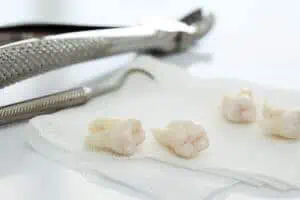Have you heard horror stories about wisdom teeth removal recovery? Or are you currently recovering from wisdom tooth extraction and wondering how much time off work you’ll need?
Yes, it’s true that wisdom teeth surgery recovery can be painful and uncomfortable, and if you’re feeling a bit apprehensive, that’s totally normal. But there are ways to make your wisdom tooth recovery manageable, more comfortable, and maybe even pleasant – OK that’s perhaps a stretch – and we’re here to tell you how!
This article is chock-full of advice for how to successfully recover from your wisdom tooth procedure including:
- What to expect after you get your wisdom teeth out
- Tips for making wisdom tooth recovery a better experience
- When to call your dentist in the case of infection or dry socket
- Answers to common questions about healing and recovery from wisdom teeth extraction
So, whether you are preparing for an upcoming procedure, or you are already in the throes of the aftermath and wondering what to do after wisdom teeth removal, we hope this article will guide you through a smooth recovery to optimal oral health.
In This Article
The extraction
This article is about how to heal after having your wisdom tooth extracted. If you are looking for in-depth information about wisdom tooth pain before extraction, click on the link!
But, just to give you a little background, we’ll recap some important information about these burdensome teeth.
Wisdom teeth are those permanent teeth that are located in the back corners of your mouth, on both your top and bottom arches. Wisdom teeth come in quite a bit later than all of your other teeth; in fact, they usually erupt between the ages of 17 and 25. That’s why they’re called wisdom teeth – they come in when you are older and wiser. Although whether anyone can be wise at the age of 17 is certainly up for debate.

For some people, wisdom teeth come in without any health problems; other, more evolved individuals have no wisdom teeth at all; and some people develop an impacted wisdom tooth. That’s when teeth don’t have the room they need to erupt normally, and often need to be extracted. An impacted wisdom tooth can cause a whole load of health problems including:
- Tooth decay
- Damage to other teeth
- Abscesses
- Not enough room to straighten crooked teeth
- Pain
- Infection
Some dentists choose to pull wisdom teeth before any health problems arise, although it’s under debate as to whether that’s the best use of patients’ money and dentists’ time.
If you do have to have wisdom teeth removed, it will most likely be an outpatient procedure, so you can go home the same day. You’ll be given either local anaesthesia, or general anaesthesia. Local anaesthesia is the most common, but your dentist will decide which is best for you based on how many extractions you will have, how much pain you are likely to feel and your level of anxiety towards dental work. You can also ask about the options for sedation dentistry, to make you calmer and less aware of what’s going on.
During the procedure, your dentist will make an incision in the gum to expose the tooth and bone, and remove any bone that is in the way of the tooth. Once the obstructing bone is removed, they will remove the tooth, clean the site, stitch the wound (sometimes) and finally, your dentist will place gauze over the extraction site. And then you’re done!
Which brings us to the main subject of this article…
Wisdom tooth removal recovery

You’ve just had your wisdom tooth out, you’re drooling from the anaesthesia, and you’re trying desperately not to poke around at the gap with your tongue. Your dentist has given you aftercare instructions but how can they possibly expect you to remember all of that information?
So what now? What do you do when you get home? How do you make sure you don’t end up right back in the dentist’s chair? And what does the healing process even look like?
All excellent questions! Let’s start with the timeline, and what you can expect.
Wisdom teeth recovery timeline
So how long does pain after wisdom tooth extraction last? Wisdom tooth healing does not happen overnight. Instead, wisdom teeth recovery is a gradual process that will take time. The good news is that your condition will improve a bit every day – even if sometimes it doesn’t feel like it. Since your head might still be a bit foggy you can have a look at this nice little table we compiled showing the timeline:
Time after removal | What to expect |
First 24 hours | Blood clots form, protecting exposed bone |
First 3 days | Swelling of the mouth and cheeks. Swelling will reach peak at the 3-day mark |
After 3 days | Swelling improves |
7 days | Your dentist will remove any stitches you may have |
7 to 10 days | Soreness and jaw stiffness will begin to go away |
2 weeks | Any bruising on your face should completely go away |
You can also expect general discomfort and soreness in and around your mouth, especially at the site of extraction, during this 2-week period.
Of course, everyone is different and your experience will depend on how many teeth you have out and how difficult the extraction is. In the video below, a vlogger named Amber shares her experience having her wisdom teeth removed under general anaesthetic. You can skip to 13:35 to see what she was like one day after wisdom teeth surgery.
Amber had some complications due to excessive bleeding which resulted in considerable swelling and pain which didn’t completely subside for around five weeks. This shouldn’t be considered a ‘normal’ wisdom tooth recovery, though.
Wisdom teeth removal aftercare
If you still have that sheet of paper with directions that your dentist gave you at the end of your procedure, you should definitely follow those instructions. But some general wisdom tooth recovery tips include:
- Don’t eat solid foods in the first 24 hours
- Don’t drink alcohol, coffee, fizzy drinks or hot beverages in the first 24 hours
- Don’t brush your teeth, spit, or rinse your mouth during the first 24 hours
- Don’t smoke during the first 72 hours
- Keep gauze over the extraction site to manage bleeding
- Take over-the-counter pain relief or prescription meds as directed
- Use a cold compress to reduce pain
- Get lots of rest
- Keep your mouth clean with salt water rinses or antiseptic mouthwash after 24 hours
- Avoid exercise and other strenuous activity for several days
- Call your dentist if anything unusual happens
What to eat after wisdom teeth removal

We can’t stress enough the importance of refraining from eating solid foods within the first 24 hours after your extraction. In fact, it’s so important that we’ll probably mention it a couple more times before the end of this article. You shouldn’t eat solid foods because they could get stuck in the socket, disrupt blood clots and further irritate the wound.
So, we could say that the best wisdom tooth recovery food is anything in liquid form. Keep this up for at least 24 hours, after which you may want to try some really soft foods, chewing away from the extraction site. 3-4 days after extraction you should be able to eat most soft solid foods, but keep away from anything hard, sticky or spicy for a few days longer.
Do keep in mind that you shouldn’t use a straw for a few days after wisdom tooth removal, because the vacuum created when you suck could dislodge the blood clot.
Wisdom teeth removal recovery tips
That’s the basics for tooth extraction aftercare covered, so now let’s look at some tips that will ensure the most comfortable and rapid healing experience that one could hope for.
Before your procedure, get your home prepared for life after removal. For the first 24 hours, you’ll need to have a primarily liquid diet. Stock up on groceries that you can make smoothies with, and have plenty of canned soup on hand. If you have a sweet tooth, now is also a good time to make sure you have ice cream and yoghurt around to easily eat as well.
After the first 24 hours, you can then move to a soft-food diet for the next four-to-five days. For soft foods, consider mashed potatoes, pasta, scrambled eggs, and avoid chewy foods like steak. Since you will be sedated in one way or another at your removal, you’ll also need to prepare to have a family member or friend accompany you so they can drive you home and care for you afterwards.
Dr. Robert Berry, Mountain Aire Dentistry
Plan ahead
Doing some preparation before your extraction will help you have an easier recovery. If it’s too late for this, you can go ahead and skip to the next step.
To plan ahead, talk to your dentist or surgeon about what you can expect. You might find it helpful to get the aftercare directions from your dentist before your mind is made fuzzy by any anaesthetic.
You may also want to do the following:
- Schedule your extraction for a time when you can take a few days off work afterwards.
- Whether you are visiting a dental clinic or a hospital, try to pick one nearby so that you can return easily if needed.
- Ask someone to come with you; they will be able to listen to your dentist’s advice and drive you home afterwards.
And, although not imperative, it’s also not a bad idea to see if someone can hang out with you for the rest of the day. Mostly to give you sympathy and make you smoothies to drink.
Prevent dry socket

After you have a tooth removed, a blood clot develops over your socket. This blood clot is integral in protecting the wound and healing your bone and nerve endings. This blood clot should stay in place until you have completely healed.
If this clot becomes dislodged, however, it can cause a condition called dry socket. You’ll know if you have dry socket because it is extremely painful.
Although a clot can become dislodged by itself, there are several things you should avoid to help it stay in place. We’ve already mentioned these above, but let’s recap. You can prevent dry socket and aid recovery after wisdom teeth removal by:
- Avoiding straws
- Avoiding smoking (tobacco or anything else, including e-cigarettes – it’s the sucking motion that’s the problem)
- Eating soft foods
- Sticking to warm – not hot – drinks
Stick to these for at least three days while you heal and read how to prevent dry socket for more guidance and information.
Elevate your head

During the first few days, try to sleep with your head elevated at about a 45-degree angle to your body. This will help you recover faster and reduce pain because it decreases the blood pressure around your wound.
Ice is nice
An ice pack or cold compress will help reduce swelling and inflammation and also help numb the pain. If using ice, wrap it in a towel to prevent ice burns, and don’t apply ice for more than 20 minutes at a time.
Make sure not to get your hot water bottle confused with your cold compress because applying heat to the site will only make matters worse.
Keep hydrated
Drink plenty of water after the extraction to keep the socket clean and your mouth hydrated. A dry mouth can disrupt your pH balance and create a breeding ground for bacteria, which of course, can cause infection and other health problems. However, don’t swish water around your mouth too vigorously while there is still a risk of the blood clot dislodging.
Liquid diet
It’s no fun to not be able to eat solid foods, but you can still enjoy a tasty and nutritious liquid diet. This is a good time to experiment with flavors you love and indulge in your favourite treats. Try the following to get started:
- Ice-cold coconut water: Coconut water is full of electrolytes, nutrients and healthy fats. Drinking it extra cold will soothe your mouth and help with any inflammation.
- Smoothies with seedless fruit: Go for an ice-cold tropical smoothie made with coconut, mango and frozen banana. Just make sure to peel your banana before you put it in the freezer!
- Kefir: This healthy liquid yogurt drink is sure to replenish some of your strength, plus it’s good for your gut. Drink it nice and cold to help with inflammation.
- Ice cream soup: Cheer yourself up with a sweet snack. Let your preferred ice cream melt (as long as it has no chocolate chunks or other crunchy bits) and sip it like a soup. Just don’t do this as a substitute for every meal.
- Water, water and more water!
Rest, rest, rest!
You may be keen to recover from wisdom teeth removal fast and get back to work, but you’ll be doing yourself a favour if you forget about your fast-paced life for a couple of days. Hire a baby sitter, a dog walker, a cleaner, whatever will make your life easier. And schedule your surgery for a three-day weekend if you’re worried about missing work.
Tell your family and friends that you will be out of commission during your wisdom tooth removal recovery time and that they can only bother you if it’s to take care of you and help you feel better. And yes, that means NO exercise, not even light exercise, for a few days.
Saltwater rinses
After 24 hours have gone by, you can mix together salt and warm water to gently rinse with a few times a day, especially after eating. This will help keep your mouth clean and free from infection and reduce pain and swelling.
Control bleeding
A little bleeding after your extraction is expected, so you should keep some gauze over the site of the wound for the first few hours after surgery. If you want to continue gently biting down on something to stop the bleeding after 12 hours, you can switch to a damp teabag. Tea leaves will help with inflammation and reduce pain and they will also promote clotting. Make sure it’s a teabag and not loose leaf tea, however.
Follow dentist directions!
If your dentist tells you anything different, you should listen to their directions, as after all, your dentist is the professional who is most familiar with your procedure and your particular case. These guidelines can be followed in addition to, but not contrary to, the advice from your dentist.
When to call your dentist

Wisdom tooth recovery should go smoothly if you follow the guidelines mentioned in this article. However, there’s always the chance that something could go wrong, such as a wisdom tooth infection, nerve damage or another serious complication, and you’ll need to call your dentist. If you experience any of the following, call your dentist or oral surgeon immediately:
- Difficulty swallowing or breathing
- Fever (sign of infection)
- Excessive bleeding
- Severe pain not relieved by prescribed medication
- Bad taste in your mouth
- Pus coming from the socket
- Numbness that doesn’t go away
- Blood or pus coming from nose
- Swelling that doesn’t start to improve after 3 days
Conclusion
Although the medical industry is rethinking the frequency with which wisdom teeth are removed, many of us will end up getting them taken out, or have already had them taken out.
Whether you’re reading this article in order to prepare yourself for an upcoming procedure, or you’ve already had your procedure and are now in the healing process, we hope you’ve found the information you need to recover quickly and as effortlessly as possible.

Of course, even if you follow all of the directions given to you by your dentist or oral surgeon, and all of the tips that we’ve outlined in this article, you’re still bound to notice some soreness and discomfort, and experience some inconveniences. The best thing you can do is continue to follow the recovery tips and directions and get plenty of rest. Finally, call your dentist or oral surgeon if you are experiencing severe swelling or pain after tooth extraction that you don’t think is a normal part of the process.
FAQs
Is wisdom teeth recovery painful?
It’s normal to notice soreness and discomfort during wisdom tooth recovery, but you shouldn’t feel intense pain if you follow the proper care directions. Don’t panic! Your painkillers, whether over-the-counter or prescribed, should help with any intense pain.
Prevent unnecessary pain by avoiding solid foods. You should be able to start eating soft solid foods 24 hours after surgery, but if you try and it hurts, it’s better to stick with liquids and avoid anything that could make things worse. If you develop an infection or dry socket, the pain will be substantial.
How long does it take for wisdom teeth holes to heal?
The time that it will take for the actual holes where your wisdom teeth were to heal is quite a bit longer than your recovery time. It will take at least a month for your jaw bone and gum tissue to repair itself. 24 hours after having your tooth removed you can gently rinse with salt water to dislodge any food that might be stuck in the socket. You can continue doing this after eating until the gum tissue is properly healed.
How long does it take to recover from wisdom teeth removal?
You should be able to go back to normal (omitting strenuous exercise) two to three days after your wisdom tooth extraction. Full recovery might take a week or two. During the healing process you may still experience some pain and soreness, and your mouth will actually take at least a month to fully heal.
How long does wisdom tooth pain last?
Some pain, swelling and discomfort are normal after any surgery, and wisdom tooth surgery is no different. Pain levels often peak at around 72 hours after surgery, but should then improve. You’ll most likely experience pain during most of the first week, and you might even experience it up to two weeks later if you get all four of your teeth out at the same time.
If pain becomes worse after 72 hours, you should contact your dentist or surgeon because this could be a sign of an infection or dry socket.
How long does bleeding last after I get my wisdom teeth out?
Some blood in the hours right after your surgery is normal. However, wisdom teeth bleeding should stop within four hours. If blood flow doesn’t stop, then you should contact your dentist or surgeon. Red-tinted saliva is still OK at that point.
What complications can happen during recovery?

Besides swelling and discomfort, the most common complication is dry socket. To prevent this, make sure not to smoke, drink from a straw, or eat solid foods too soon after extraction.
Another complication that could happen includes an infection. An infection can happen if you don’t stay hydrated, or you breathe too much through your mouth. This will result in a dry mouth, which creates a wonderful place for infection-causing bacteria to proliferate.
You might also experience nerve damage after you get a tooth pulled. Nerve injuries can cause pain or numbness. Usually, it’s temporary but if the pain or numbness lasts for more than 6 weeks, that means it’s likely permanent.
When can I start running again after getting my wisdom teeth pulled?

Avoid exercise after your surgery – the first 24 hours after your teeth are removed should be dedicated to rest, rest and more rest. You should not be trying to do any exercise during this time. After 24 hours, you can move around a bit more, but you should avoid any heavy lifting or cardio.
You’ll want to avoid returning to running until at least a week has passed, perhaps even two weeks. But you should listen to your body. If you feel any pain or discomfort when you run, or if you still have some swelling, then that’s a sign that you should wait.
If you start running too soon, you could dislodge your blood clots and end up right back in the hospital, and then have another delay before you can get back into your routine. The bottom line is, rest now so you can be active later.
American journal of orthodontics and dentofacial orthopedics: Evaluation and management of asymptomatic third molars: Lack of symptoms does not equate to lack of pathology. Consulted 9th January 2020.
Science Alert: Evidence Is Mounting That Routine Wisdom Teeth Removal Is a Waste of Time. Consulted 17th February 2020.





